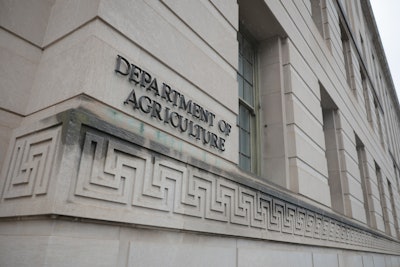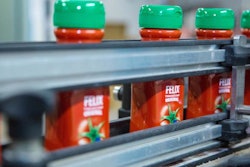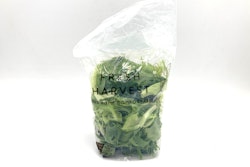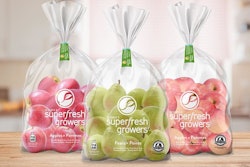As part of its $10 million Sustainable Packaging Innovation Lab (SPIL) and Assisting Specialty Crop Exports Initiative (ASCE), the USDA has awarded 22 research grants to entities aiming to advance packaging materials and approaches in the U.S. fresh produce sector, the agency says in a press release.
The USDA notes the importance packaging plays in the exportation of fresh fruits, vegetables, and specialty crops, which centers around ensuring food safety and quality from the farm stage to consumer’s tables as well as supporting production traceability. The agency says American growers need more access to new packaging solutions and innovations, which are feasible for adoption in fresh produce. The USDA’s funding efforts help advance research toward solutions to support U.S. fresh produce exporters, including the development, testing, piloting, and commercialization of new packaging materials and technologies.
USDA FAS selected Clemon University and the Foundation for Fresh Produce of the International Fresh Produce Association to lead the program in partnership with the Foundation for Food and Agriculture Research (FFAR) to administer it, the agency says.
The 22 entities awarded funding and their research focuses include the following, per the USDA’s release:
· Akorn Technology Inc.: advancing a validated, edible thin-film coating for cucumbers and bell peppers through commercial-scale pilots with industry partners.
· BioLogiQ Inc.: piloting and validating plant-based materials for specialty crop packaging and scale-up, including a compostable design and another using post-consumer recycled plastic; applicable to many fruits, vegetables and greens, as well as pallet wrap and shipping pallets.
· Clemson University: developing and testing a cross-linked starch-based barrier coating for paper packaging of almonds, and a project on compostable price-look-up stickers and labels from plant-derived plastics for products such as apples, pears, peppers, cucumbers and melons.
· Corumat Inc.: developing prototypes for fresh produce applications and piloting compostable, styrofoam-like bioplastic packaging for use in box liners, boxes and clamshells, with applications for berries, tree fruit and fresh-cut produce.
· It's Fresh Ltd.: creating ethylene-controlling, paper-based packaging for export and retail that extends shelf life and reduces food waste for raspberries, blueberries, strawberries and other ethylene-sensitive fruits such as avocados.
· Kwik Lok: testing and piloting compostable bag closures and labels that include traceability data.
· Metalchemy: developing biodegradable, antimicrobial agar-cellulose packaging to extend shelf life and reduce food waste, with use cases for table grapes, berries, mushrooms and tomatoes.
· Michigan State University: conducting pilot-scale testing of recyclable and compostable corrugated boxes for bulk and retail packaging of fruits, vegetables, herbs and nuts.
· Nat4Bio: finalizing formulation and packaging trials of a biopolymer coating for citrus, with applicability for apples, pears and blueberries.
· NatureSweet: testing and transitioning tomato packaging to recycled PET, with validation through lab-scale testing, shelf-life studies and real-world shipping trials.
· NNZ Inc.: prototyping and testing compostable, stackable trays for commercial scalability, with focus on logistics efficiency and regulatory compliance in export markets.
· Nvirovate Materials: designing and testing compostable produce look-up labels for regulatory compliance, with pre-pilot validation and deployment for apples.
· PakItGreen Inc.: refining and prototyping oxygen- and moisture-barrier coated bags for fiber-based packaging of salads and other fresh-cut produce.
· PeelON: optimizing and piloting compostable, plant-based thin film and bags for crops including leafy greens, citrus, grapes, blueberries and fresh herbs.
· SAVRpak: testing and optimizing a moisture-absorbing pad that eliminates the need for cold storage during transportation, with testing focused on avocados.
· Sway: scaling and commercializing compostable, seaweed-based packaging for table grapes, cherries, citrus, apples and leafy greens.
· University of Georgia Research Foundation: scaling and piloting production of a home compostable label adhesive for fresh produce, with use for stone fruit, apples, pears, citrus, onions and other vegetables.
· University of Maine, in partnership with Sappi and the Cal Poly Strawberry Center: developing fully recyclable, cellulose-based packaging for strawberry and blueberry exports, with future applicability to bagged salads and other ready-to-eat produce.
· University of Missouri: developing novel, sprayable antimicrobial coating materials for food packaging, with a focus on cherry tomato exports.
· Vireo Advisors: advancing commercialization of a cellulose-based food coating by establishing a food-grade production process and securing regulatory approval for use with cherries, blueberries and other produce.
· Virginia Tech: scaling chitin nanofiber packaging with passive cooling properties to extend the shelf life of strawberries.
The USDA’s research investment comes two years after its funding to build, expand, and renovate processing facilities in the Midwest. Former Agriculture Secretary Tom Vilsack described the 2023 move to further “provide farmers with the opportunity to receive assistance they need to continue farming, to build and maintain their competitive-edge, and to access more, new, and better markets.”



























